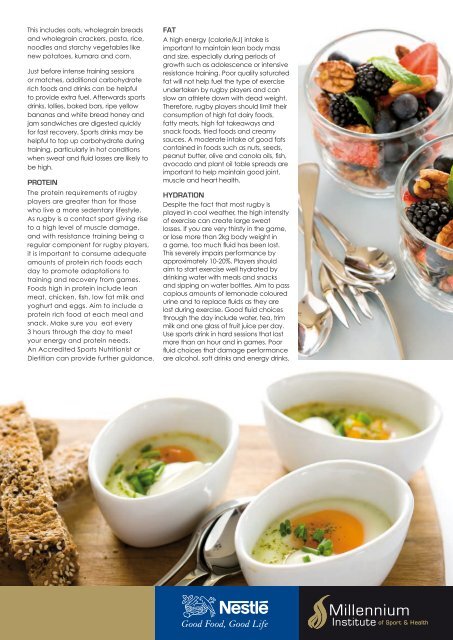Rugby - Millennium Institute of Sport and Health
Rugby - Millennium Institute of Sport and Health
Rugby - Millennium Institute of Sport and Health
Create successful ePaper yourself
Turn your PDF publications into a flip-book with our unique Google optimized e-Paper software.
This includes oats, wholegrain breads<br />
<strong>and</strong> wholegrain crackers, pasta, rice,<br />
noodles <strong>and</strong> starchy vegetables like<br />
new potatoes, kumara <strong>and</strong> corn.<br />
Just before intense training sessions<br />
or matches, additional carbohydrate<br />
rich foods <strong>and</strong> drinks can be helpful<br />
to provide extra fuel. Afterwards sports<br />
drinks, lollies, baked bars, ripe yellow<br />
bananas <strong>and</strong> white bread honey <strong>and</strong><br />
jam s<strong>and</strong>wiches are digested quickly<br />
for fast recovery. <strong>Sport</strong>s drinks may be<br />
helpful to top up carbohydrate during<br />
training, particularly in hot conditions<br />
when sweat <strong>and</strong> fluid losses are likely to<br />
be high.<br />
protEIN<br />
The protein requirements <strong>of</strong> rugby<br />
players are greater than for those<br />
who live a more sedentary lifestyle.<br />
As rugby is a contact sport giving rise<br />
to a high level <strong>of</strong> muscle damage,<br />
<strong>and</strong> with resistance training being a<br />
regular component for rugby players,<br />
it is important to consume adequate<br />
amounts <strong>of</strong> protein rich foods each<br />
day to promote adaptations to<br />
training <strong>and</strong> recovery from games.<br />
Foods high in protein include lean<br />
meat, chicken, fish, low fat milk <strong>and</strong><br />
yoghurt <strong>and</strong> eggs. Aim to include a<br />
protein rich food at each meal <strong>and</strong><br />
snack. Make sure you eat every<br />
3 hours through the day to meet<br />
your energy <strong>and</strong> protein needs.<br />
An Accredited <strong>Sport</strong>s Nutritionist or<br />
Dietitian can provide further guidance.<br />
FAt<br />
A high energy (calorie/kJ) intake is<br />
important to maintain lean body mass<br />
<strong>and</strong> size, especially during periods <strong>of</strong><br />
growth such as adolescence or intensive<br />
resistance training. Poor quality saturated<br />
fat will not help fuel the type <strong>of</strong> exercise<br />
undertaken by rugby players <strong>and</strong> can<br />
slow an athlete down with dead weight.<br />
Therefore, rugby players should limit their<br />
consumption <strong>of</strong> high fat dairy foods,<br />
fatty meats, high fat takeaways <strong>and</strong><br />
snack foods, fried foods <strong>and</strong> creamy<br />
sauces. A moderate intake <strong>of</strong> good fats<br />
contained in foods such as nuts, seeds,<br />
peanut butter, olive <strong>and</strong> canola oils, fish,<br />
avocado <strong>and</strong> plant oil table spreads are<br />
important to help maintain good joint,<br />
muscle <strong>and</strong> heart health.<br />
hYDrAtIoN<br />
Despite the fact that most rugby is<br />
played in cool weather, the high intensity<br />
<strong>of</strong> exercise can create large sweat<br />
losses. If you are very thirsty in the game,<br />
or lose more than 2kg body weight in<br />
a game, too much fluid has been lost.<br />
This severely impairs performance by<br />
approximately 10-20%. Players should<br />
aim to start exercise well hydrated by<br />
drinking water with meals <strong>and</strong> snacks<br />
<strong>and</strong> sipping on water bottles. Aim to pass<br />
copious amounts <strong>of</strong> lemonade coloured<br />
urine <strong>and</strong> to replace fluids as they are<br />
lost during exercise. Good fluid choices<br />
through the day include water, tea, trim<br />
milk <strong>and</strong> one glass <strong>of</strong> fruit juice per day.<br />
Use sports drink in hard sessions that last<br />
more than an hour <strong>and</strong> in games. Poor<br />
fluid choices that damage performance<br />
are alcohol, s<strong>of</strong>t drinks <strong>and</strong> energy drinks.


